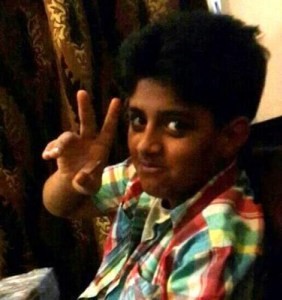On 25 May, the Saudi government transferred Murtaja Algariras, a minor, to the General Directorate of Investigations (GDI) prison in al-Dammam. The GDI, also known as al-Mabahith, has a reputation for torturing prisoners, renewing concerns that Saudi authorities are subjecting juvenile detainees like Algariras to abuse.
Algariras was arbitrarily arrested on 20 September 2014 while crossing the King Fahd Bridge between Bahrain and Saudi Arabia. He was traveling with his family when he was stopped and arrested on the scene without warrant. He was 13 years old at the time.
Saudi authorities held Algariras for two years and eight months in Dar al-Mulahaza, the juvenile detention center in Dammam without formal charge or trial. Officials had previously referenced plans to release the 16-year-old during the month of Ramadan this year, but have now moved him to a prison that has a record of mistreatment and torture, including the extraction of false confessions.
On 20 January, a statement issued by the United Nations Working Group on Arbitrary Detention found that Algariras was being arbitrarily detained and that Saudi officials were violating multiple articles of the Universal Declaration of Human Rights. The Working Group also called for his immediate release – a call that was clearly ignored by the Saudi government.
Algariras’ case stands as another example of the Saudi government’s mistreatment of juvenile prisoners, which is an increasingly well-documented trend. As early as 2008, Human Rights Watch (HRW) issued a report finding that the Saudi penal system failed to uphold children’s rights and to protect them from mistreatment. Judges were free to impose violent punishments like flogging, amputation, and even death. When HRW published its report in 2008, Saudi courts had sentenced at least 12 people to death who were under the age of 18.
In October 2013, the Child Rights International Network (CRIN) submitted a briefing to the UN Human Rights Council for Saudi Arabia’s Universal Periodic Review. Their report exposed that few legal changes had been made to improve protection for juvenile prisoners, and those that were made were either arbitrary or not enforced. Moreover, what positive reforms were implemented did not apply to girls. According to CRIN, Saudi authorities executed a 17-year-old girl in January 2013. Currently, CRIN ranks Saudi Arabia 181st out of 197 countries for access to justice for children.
Such human rights violations remain ongoing in Saudi Arabia. For example, on 2 January 2016, the Saudi government killed 47 individuals in a mass execution. Several of those executed were minors. At least one killed, believed to be Mustafa Abkar, was 14 when arrested and spent 12 years in prison before his execution. On 17 April 2016, HRW reported that another four child offenders were to be executed following convictions of charges related to terrorism. HRW recorded “flagrant” violations of due process during the trials. Three of the four juvenile offenders are Ali al-Nimr, Dawoud al-Marhoun, and Abdullah al-Zaher. Saudi authorities arrested the juveniles in 2012 following their participation in peaceful protests in 2011. Ali al-Nimr is the nephew of prominent Shia cleric Sheikh Nimr al-Nimr, who was beheaded in the January 2016 mass execution. Ali’s mother speculates that the Saudi government was using Ali as a tool to get to his uncle. When the lawyers for Ali, Dawoud, and Abdullah asked that the interrogators that allegedly obtained their clients’ confessions testify, judges blocked their requests despite evidence that the confessions were coerced. All three of the men are being held in the same al-Mabahith prison to which Algariras has been moved.
Despite its claims to be adhering to UN human rights agreements, the Saudi government fails to protect the rights of juvenile prisoners. Steps must be taken to ensure protection of individuals such as Murtaja Algariras that are subject to arbitrary arrest and illegal detention. The government must also ensure that due process and fair trials are carried out in cases regarding child offenders. The international community must see to it that the Saudi government is held accountable for these human rights violations and that progress is made in constructing strong institutions that protect children who cannot protect themselves.
Alex DiBell is an Advocacy Intern at ADHRB.





